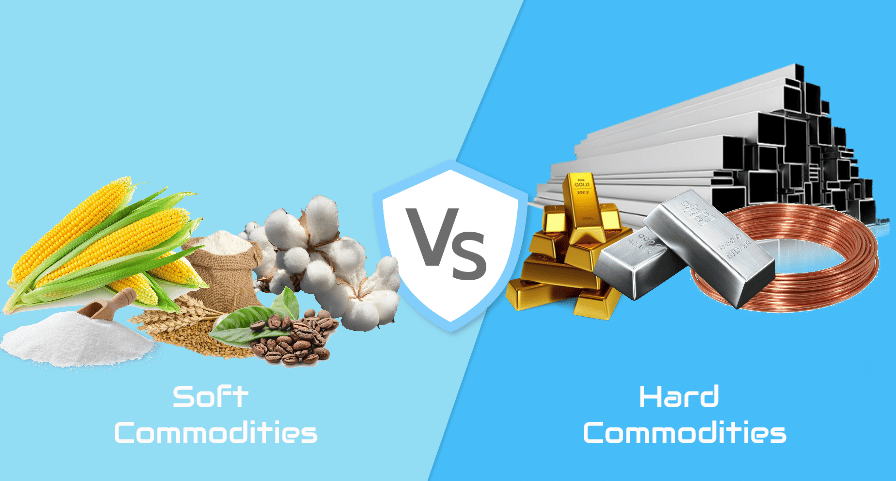

Soft commodities play a significant role in the global economy, providing essential goods that are grown or produced rather than extracted. They encompass a wide range of agricultural products such as coffee, cocoa, sugar, cotton, and many more. In this blog, we will delve into what soft commodities are, explore the potential benefits and risks of investing in them, discuss the growing trend of sustainable investing in this sector and look at reliable commodity trading platform in SA.
Types of Soft Commodities
Soft commodities refer to agricultural products that are grown, not mined. These goods are the backbone of various industries, providing food, beverages, clothing, and other essential items. The most common forex trading soft commodities include coffee, cocoa, sugar, cotton, soybeans, wheat, and corn. Unlike hard commodities like gold or oil, soft commodities are susceptible to supply and demand fluctuations based on weather conditions, geopolitical factors, and global consumption patterns.
Investing in Soft Commodities
The realm of soft commodities is vast and diverse. It includes:
- Coffee: One of the most widely consumed beverages globally, coffee is a popular commodity traded in various markets.
- Cocoa: Used primarily in chocolate production, cocoa is a significant commodity with consistently high demand.
- Sugar: From sweetening our beverages to being a crucial ingredient in the food industry, sugar is another essential commodity.
- Cotton: As a primary material for the textile industry, cotton is a key commodity whose demand is driven by the fashion market.
- Soybeans: These versatile legumes find application in various sectors, including animal feed, cooking oil, and biofuels.
- Wheat and Corn: Staple foods for much of the world’s population, wheat and corn are vital soft commodities.
Investing in Soft Commodities:
Investing in soft commodities can be done through various avenues, including futures contracts, exchange-traded funds (ETFs), and commodity-focused mutual funds. Each method has its advantages and disadvantages, and investors should carefully consider their risk tolerance and investment goals before choosing one.
Benefits of Soft Commodity Investing
- Diversification: Adding soft commodities to an investment portfolio can provide diversification benefits, as their performance is not directly correlated with traditional assets like stocks and bonds.
- Hedging against Inflation: Soft commodities’ prices often rise during inflationary periods, making them a potential hedge against currency devaluation and rising living costs.
- Global Demand: With a growing global population, the demand for soft commodities is expected to increase, potentially leading to attractive investment opportunities.
- Supply Constraints: Unpredictable weather patterns and geopolitical factors can lead to supply constraints, which may drive up the prices of soft commodities.
Risks of Soft Commodity Investing
- Price Volatility: Soft commodity prices can be highly volatile due to external factors such as weather conditions, diseases, and political events.
- Seasonal Fluctuations: The agricultural nature of soft commodities makes them susceptible to seasonal fluctuations, impacting supply and prices.
- Geopolitical Risks: Political instability in major producing regions can disrupt the supply chain and affect commodity prices.
- Storage and Transportation Issues: Unlike hard commodities, soft commodities can perish, making proper storage and transportation critical for investors.
Sustainable Investing in Soft Commodities
As environmental and social concerns gain prominence, sustainable investing in soft commodities has emerged as a compelling approach. This involves supporting companies and initiatives that prioritise environmentally friendly practices, fair labour conditions, and responsible sourcing. Sustainable investing not only aligns with ethical principles but also aims for long-term profitability by addressing potential risks associated with unsustainable practices.
Evaluating Soft Commodity Investments
Before investing in soft commodities, investors should conduct thorough research and consider factors such as historical price trends, market demand, global supply, and geopolitical conditions. Diversification within the soft commodities sector can also mitigate specific risks associated with individual commodities.
Start Trading With a Commodity Trading Platform
To start trading soft commodities, investors can use commodity trading platforms like Banxso – Online Trading Brokerage which provide access to various markets and financial instruments. These platforms offer real-time data, analysis tools, and the ability to execute trades efficiently.
Conclusion
Soft commodities represent a crucial aspect of the global economy, and investing in them can offer both opportunities and challenges. While soft commodity investing can diversify portfolios and act as a potential hedge against inflation, it comes with inherent risks due to price volatility and supply chain complexities. Sustainable investing in soft commodities is gaining traction, providing investors with a way to align their financial goals with their ethical values. As with any investment, due diligence, proper risk assessment, and staying informed about market trends are essential for making informed decisions in the world of soft commodities trading.


I have been writing about crypto for over two years. I have a vast amount of experience in the industry and my work has been featured on some of the biggest publications in the space.
